| 2002 was another highly successful year for Keller, in which we significantly improved margins and continued our strong track record of growth. Whilst we faced difficult conditions in some of our traditional markets, the range and technical superiority of our products and the diversity of markets we serve once again held us in good stead. |
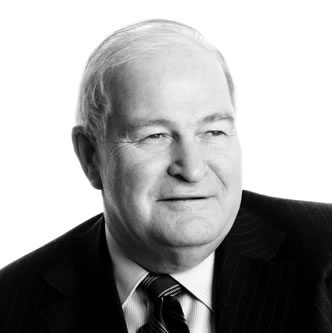 |
| Conditions in our major markets |
| Despite the general economic uncertainty in the US, the construction market has remained resilient. Towards the end of 2002, activity slowed in the commercial sector, whilst housing and public infrastructure continued to be strong. The picture across Europe was mixed: Germany saw construction output fall for the eighth consecutive year and Poland and Switzerland both experienced a construction slowdown. France and Sweden remained robust, whilst Italy showed signs of growth. Housing and infrastructure were fairly strong in the UK, but the ground engineering sub-sector remained flat. Overseas, the Far East once again offered good opportunities, whilst the Middle East continued to be slow. In Australia, both the commercial and infrastructure sectors saw recovery from a post-Olympic slump. |
| Strategic developments |
| Last year, we made further significant progress towards our strategic objective of developing our global leadership in our core foundations business, whilst expanding the range of specialist products and services we offer to the built environment. In Foundation Services, the acquisition of Vibropile consolidates our number one ranking in the Australian foundations sector; our 51% interest in Keller-Terra will enable us to penetrate the growing and attractive Spanish ground engineering market; whilst the acquisition of McKinney reinforces our position as the leading provider of foundation services in the US. In Specialist Services, we acquired an 84% interest in Wannenwetsch, the supplier of robotic hydrodemolition services for precision concrete removal, to complement the services already offered by Makers in the concrete refurbishment market. In addition, the acquisition of Accrete is enhancing the position of Makers Infrastructure as a major partnering contractor in the water sector. We are confident that we have the experience, skills and resources to add value to these businesses and to manage their integration, as our past track record amply demonstrates. |
| Foundation Services |
| The Foundation Services
operations had another excellent year in 2002, with sales 4% ahead
of last year at £361.4m (2001: £347.8m) and operating
profit before amortisation of goodwill of £27.7m (2001: £23.6m),
17% better than the previous year’s good performance. This result
reflects improved margins from 6.8% to 7.7%, combined with continued
good organic growth. North America Hayward Baker achieved another good, balanced performance with steady margin growth in the established business, complemented by the strong performance of recent acquisitions, further increasing Hayward Baker’s market penetration. The business continued to extend its geographic presence through the opening of new branch offices in Boston and Houston. Sales were once again dominated by small to medium sized jobs across the United States, for which Hayward Baker’s highly developed, regional structure enables it to compete successfully and profitably. Risk management continues to be a priority and Hayward Baker continues to focus on projects with acceptable margins and levels of risk. The successful $23m Wickiup Dam remediation project, a superjet grouting and earthworks project for the US Bureau of Reclamation, was an exception to the normal job profile. This is the largest single jet-grouting project ever performed in the US, involving two rigs working two shifts a day from April through to October, creating a total of over 200,000 cubic yards of Soilcrete within the dam. Other significant projects undertaken during the year included a groundwater control and excavation project using various grouting techniques for a new sewer tunnel in Los Angeles; and a soil mixing scheme to improve the stability of a site for three 310-foot diameter petroleum tanks in Louisiana. Case Foundation and Case Atlantic had a record year, with both sales and operating profit significantly ahead of the previous year’s very strong performance. Following its opening in January 2002, the new office in Phoenix performed well, continuing the geographic expansion of the Case operation. Amongst the noteworthy jobs undertaken during the year were the foundation system for the Hyatt Center in Chicago; the installation of caissons to support highway and railway bridges over the Tennessee River in Northern Kentucky; and construction of concrete diaphragm walls at the University of Chicago Graduate School. The largest single job in Case’s 50-year history, the Cooper River Bridge in Charleston, South Carolina, began in 2002 and was 60% complete at the year end. The project is being performed by Case Atlantic and involves the construction of 10-foot diameter caissons to a maximum depth of 230 feet. At the end of 2002, we completed our acquisition of McKinney, a leading provider of drilled shaft caissons across the Eastern US. This high-margin, well-established business operates principally in the civil (highways and bridges) and commercial sectors. Operating at the small to mid-diameter end of the caisson market, the McKinney products complement those offered by Case and, whilst McKinney will continue to be managed separately, there are expected to be some synergies between the two businesses. Continental Europe & Overseas Our Continental Europe & Overseas business gave another excellent performance. Once again, the broad spread of markets we serve provided some insulation from the difficult economic conditions persisting in parts of Europe and the Middle East. In the face of keen competition, the continuous development of technologies such as Vibro and Soilcrete has been key to maintaining our market leading edge. Against a general downturn in the German construction market of around 9% last year, our German operation saw a slight reduction in sales, but improved its margin significantly, thereby increasing its contribution. We saw an increase in sales in Austria, despite growing competition, and in France, after extending the range of products on offer and our geographic reach. In Sweden, we increased sales volume and margins, predominantly using the lime column technology of our LCM subsidiary which we continue to introduce to other territories. After a difficult start to the year, our operation in Poland saw a recovery in the second half, when it took on a significant amount of flood protection work. With a steady performance in the Czech Republic and Slovakia and an established presence in Croatia, we are well positioned to take advantage of the growth opportunities that are expected to result from an enlarged European Union. Within the Overseas division, the Far East region delivered the lion’s share of sales volume and profit. In Singapore, two large sand compaction contracts for land reclamation schemes progressed well. A good performance was delivered on the Ipoh-Rawang railway project, which marked the introduction of the LCM technology to Malaysia. Results for the Middle East region were in line with our expectations. Our geographic expansion continues with the establishment of a new branch in Morocco and subsidiaries in India and Algeria. UK In line with the results for the half year, volumes in KGE, the UK foundation business, were some 6% down on the previous year, whilst margins improved, justifying our concentration on value-added, higher-margin products. The range of solutions KGE can provide is a key factor in winning work and last year, as anticipated, KGE stepped up its offering of mixed-product packages. An example of this was the solution for a brownfield site in Feltham, Middlesex, being developed by a leading housebuilder. A combination of vibro stone columns, driven cast in-situ piles, continuous flight auger bored piles and dynamic compaction provided a cost-effective and technically efficient means of stabilising the ground and supporting the proposed structures. KGE’s package offering has been enhanced by the development of soil reinforcing systems, which provide an alternative to concrete, steel or brickwork retaining walls, with a particular application in rail and highway improvement schemes. Throughout 2002, KGE developed new partnering relationships with a number of general contractors and homebuilders, resulting in an increased proportion of repeat and negotiated work. Such a relationship led to Keller’s involvement in the high profile Blackheath project, where compaction grouting was used to stabilise a road collapse on the main A2 route through Greenwich into central London. The single biggest contract on which KGE was engaged during the year was CTRL 310, where it is installing large diameter rotary bored pile foundations to support structures for the second phase of the Channel Tunnel Rail Link. Australia 2002 saw a very strong performance from Franki Australia and an excellent result by our mid year acquisition, Vibropile. Franki Indonesia also performed particularly well, in light of the continuing fragile economy and an almost total lack of foreign investment. Major contracts in Australia during the year included the foundations for the prestigious 88-storey “Q1” Tower on the Gold Coast and the Asset Development Project for BHP-Billiton at Port Hedland in northern Western Australia, a particularly demanding design and construct package requiring very close co-operation with the client. Franki also successfully carried out jet-grouting to retain the basement boundaries on a refurbishment project in Manly, Sydney with extremely restricted access and used compaction grouting techniques for Port Waratah Coal Services to re-level a conveyor transfer house that had tilted at their Kooragang Terminal, near Newcastle. The acquisition of Vibropile has strengthened Keller’s position as the leading specialist foundation contractor in Australia, bringing expertise in hard rock rotary drilling, deep continuous flight auger and rotary displacement piles to complement our existing range of products. |
| Specialist Services |
| The results for the
Specialist Services operations include, for the first time, a full
year for Suncoast. With sales of £149.6m and operating profit
before amortisation of goodwill of £8.8m, Specialist Services
now accounts for 29% of Group turnover and 26% of operating profit. Makers Last year, Makers started to reap the benefits of the investment in core business systems, which characterised the previous year and created the platform for growth. The business is now clearly structured around its key markets – social housing, car parking and infrastructure – in which Makers has established a growing number of long term partnering relationships. In social housing, which accounts for around 50% of turnover, Makers worked with 21 out of 33 London Boroughs, together with a further 25 local authorities outside London. Makers was pleased to secure first time contracts with the London Boroughs of Lambeth and Islington and Mercian Housing Association. The successful track record with the City of Westminster, which has been at the vanguard of partnering arrangements for social housing refurbishment, has resulted in approaches from other authorities looking to adopt the Westminster model. Makers is hopeful of securing partner status with a number of these clients in 2003. During the year, the business moved into reactive maintenance services through its joint venture company, Makers Haywards Property Services (MHPS). Supported by a state-of-the-art communication and job-processing system, MHPS had a pleasing first year, serving several housing “villages” within the City of Westminster. Makers Parking completed the refurbishment works at Heathrow’s Short Stay Car Park 1 and replaced support columns at Car Park 3 which had been unsettled by the tunnelling for the adjacent Heathrow Express railway line. In addition to working with BAA and other clients on deteriorated car park structures, Makers completed its first new build multistorey car park during the year. The innovative and practical design of this steel-framed car park attracted significant interest and Makers is about to embark on a similar project for Norwich City Council. Last year, Makers restructured its former civil engineering repair division into dedicated teams of industry specialists under the new name Makers Infrastructure. The infrastructure division works on capital refurbishment projects, either as a main contractor or as a specialist supply chain partner, to the highway authorities, the railway industry and utilities. Makers’ position in the UK water market was strengthened through the acquisition of Accrete in August 2002. Accrete provides a wide range of maintenance, refurbishment and security services to the water and waste-water industry through framework agreements with Scottish Water, Yorkshire Water, South West Water and Vivendi. Wannenwetsch During the year we increased our stake in Wannenwetsch to 84%, from our original 49% interest acquired in January 2002. Wannenwetsch returned an excellent margin on sales that were almost entirely domestically sourced in Germany. With a new management team in place, the business will now focus on growing its share of the repair and maintenance market, one of the expanding segments of the construction market in Central Europe, and taking its technology into new territories. Suncoast |
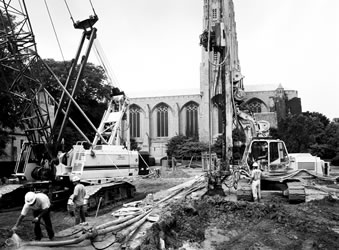 |
| Hayward Baker Triple tube jet–grouting at the University of Chicago, USA |
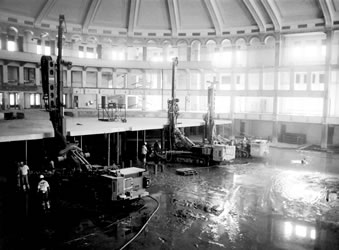 |
| Hayward Baker Installing micropiles, Milwaukee Theater renovations, USA |
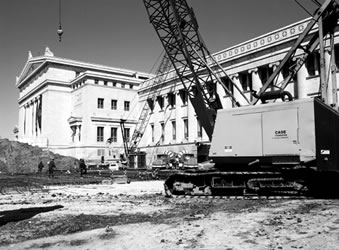 |
| Case Slurry wall installation at Chicago’s Field Museum, USA |
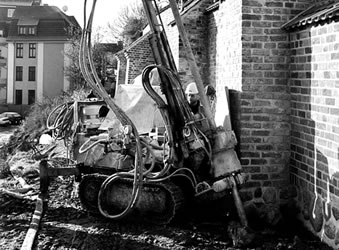 |
| Keller Continental
Europe & Overseas Soilcrete rig at work in Rostock, Germany |
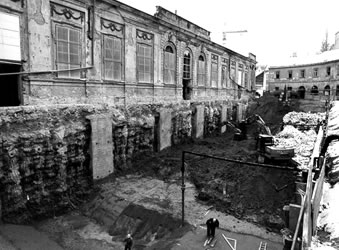 |
| Keller Continental
Europe & Overseas Securing an excavation pit at Vienna’s Museum Quarter, Austria |
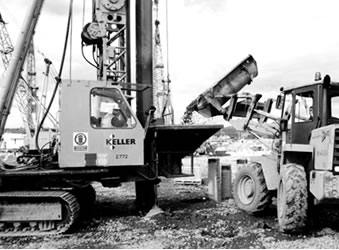 |
| KGE Vibrocat rig in operation at housing development, Feltham, UK |
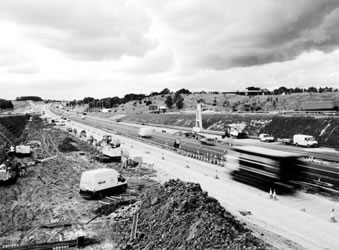 |
| KGE Slope stabilisation for M11 road widening scheme, Stansted, UK |
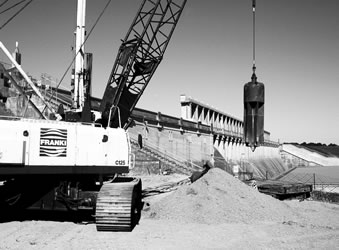 |
| Franki Installing a stone column wall at the Hume Dam, NSW, Australia |
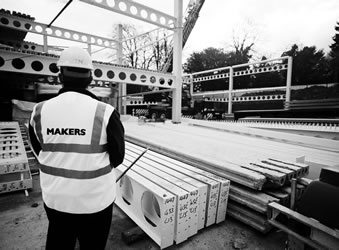 |
| Makers New build multistorey car park, Amersham, UK |
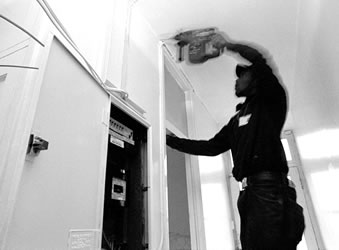 |
| Makers Refurbishing homes under the “Decent Homes Standard”, London, UK |
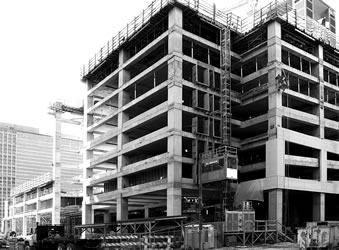 |
| Suncoast Post-tensioned structural spans at 5 Houston Center, Texas, USA |
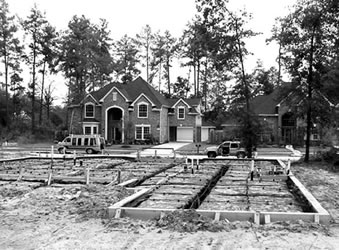 |
| Suncoast Post-tensioned floor slabs for housing development, Texas, USA |